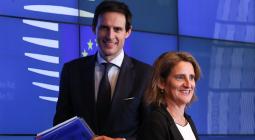‘Energy turmoil’ looms unless demand is checked, says Cop28 president
Sultan Al Jaber, an oil executive, calls for governments to be ‘honest’ about costs involved in transition to net zero
The problem of the ever-growing demand for power must be addressed if the world is not to risk descending into “energy turmoil” as it transitions towards clean energy, according to the president of last year’s Cop28 summit.
In a discussion hosted by the International Energy Agency, Sultan Al Jaber warned governments that they must be “honest and transparent” about the potential costs of transition, and the trade-offs involved in transforming energy supplies.
Al Jaber said: “The energy transition will lead to energy turmoil … if we only address the supply side of the energy equation.
“We must be balanced, we must tackle the demand side … We cannot and should not pursue the energy transition by only looking and working on one side of the equation.”
“Massive investment” was required to commercialise zero-carbon alternatives to heavy industries, and in new grid infrastructure to deliver renewable energy to end users, he said. Al Jaber is the chief executive of the Abu Dhabi National Oil Company (Adnoc), which is planning a $150bn investment (£120m) in oil and gas over seven years. Al Jaber previously said this investment was to meet continuing demand for oil and gas.
“This would require governments and all relevant parties simply to be honest and transparent about the costs and trade offs that are going to be involved,” he said. “We can no longer not be upfront, clear and transparent with all the associated costs and the potential trade-offs that could potentially be involved.”
The ballooning world demand for energy is expected to continue growing, with the oil company ExxonMobil predicting that global demand will rise another 15% from 2021 levels by 2050. Unless that demand can be reduced, it is unlikely that global carbon reduction targets can be met, but many governments are reluctant to look at the complex issues around this area.
Al Jaber’s comments came in a speech calling for governments to take action on the “UAE consensus”, the agreement reached at the summit in Dubai last year, which for the first time included the goal of a transition away from fossil fuels.
Now nations must lay out plans for how they will reach those targets. “We must now turn an unprecedented agreement into unprecedented action and results,” Al Jaber said, adding that countries must update their climate plans, known as nationally determined contributions (NDCs).
The landmark 2015 Paris agreement, in which countries committed to try to limit global warming to 1.5C (2.7F) above preindustrial levels, requires that countries update their NDCs every five years.
John Kerry, the US climate envoy, who also spoke at the event, warned that current plans were not sufficient to meet the ambitious goals of Cop28.
“Saying we will, for the first time in history, transition away from fossil fuel, and adjust in an orderly equitable manner … and in accordance with the science that by 2050 [we will] accomplish net zero, means everybody has to have a plan, and that is not where we are today,” Kerry said.
In a veiled swipe at China, Kerry made reference to one Asian country preparing to bring 360gW of coal-fired power online. “And if that happens, it will wipe out all of the gains of Europe, the US and other parts of the world,” he said.
“There’s no faking it in this next period of time,” Kerry said.
Kerry, who has served as the US climate envoy for three years, announced plans in January to step away from the role this spring.
Cover photo: Sultan Al Jaber was speaking at a discussion hosted by the International Energy Agency. Photograph: Amr Alfiky/Reuters





